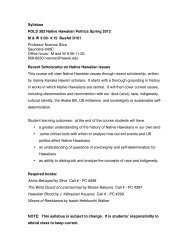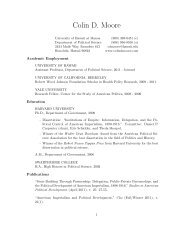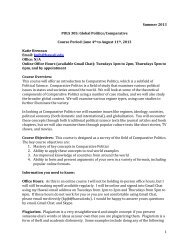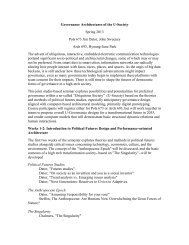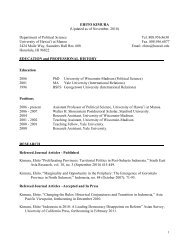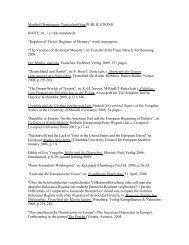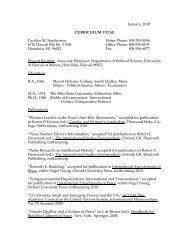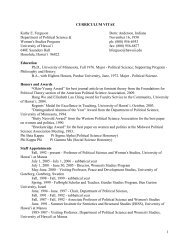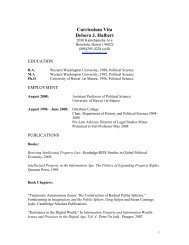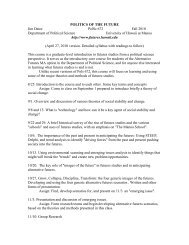2011 graduate student guide - Department of Political Science ...
2011 graduate student guide - Department of Political Science ...
2011 graduate student guide - Department of Political Science ...
Create successful ePaper yourself
Turn your PDF publications into a flip-book with our unique Google optimized e-Paper software.
DEPARTMENT OF POLITICAL SCIENCE GRADUATE STUDENT GUIDE<br />
The <strong>Department</strong><br />
The <strong>Department</strong> <strong>of</strong> <strong>Political</strong> <strong>Science</strong> began as a joint<br />
department with History in the 1940s. The two separated<br />
in 1942 with courses on government taught by the Vice<br />
President <strong>of</strong> the University and by Paul Bachman, then<br />
the Dean <strong>of</strong> Academic Affairs. Within several years, the<br />
<strong>Department</strong> recruited its first pr<strong>of</strong>essor, Allan Saunders<br />
from Amherst College, who wrote the curriculum and<br />
began planning for the growth <strong>of</strong> an autonomous<br />
faculty. The <strong>Department</strong> quickly gained momentum with<br />
the recruitment <strong>of</strong> faculty from premier mainland<br />
institutions known for political science: primarily the<br />
University <strong>of</strong> Minnesota and Michigan State University.<br />
The <strong>Department</strong> began <strong>of</strong>fering a B.A. in political<br />
science in 1945, closely followed by the M.A degree in<br />
1947. The <strong>Department</strong> continued to grow in size and<br />
visibility and had gained national stature by the time it<br />
<strong>of</strong>fered the Ph.D. degree in 1962. Throughout the 1960s,<br />
the <strong>Department</strong> attracted creative young faculty as well as<br />
well-established pr<strong>of</strong>essors in a variety <strong>of</strong> sub-fields. Led<br />
by Bob Cahill, Harry Friedman, Werner Levi, Bob<br />
Stauffer, and others, 1964-1970 was a time <strong>of</strong> rapid<br />
growth as the number <strong>of</strong> faculty increased from 15 to 27.<br />
Their productivity as scholars helped put the <strong>Department</strong><br />
on the list <strong>of</strong> top <strong>graduate</strong> programs in <strong>Political</strong> <strong>Science</strong>.<br />
Over the years the <strong>Department</strong> has hosted numerous<br />
visiting scholars, including Johan Galtung (one <strong>of</strong> the<br />
founders <strong>of</strong> peace research), John Gerassi (biographer <strong>of</strong><br />
Jean Paul Sartre), Cheryl Payer (author <strong>of</strong> The World Bank),<br />
Peter Manicas (author <strong>of</strong> The Death <strong>of</strong> the State), Betty<br />
Nesvold (former President <strong>of</strong> the Western <strong>Political</strong> <strong>Science</strong><br />
Association), William Irwin Thompson (author <strong>of</strong> Pacific<br />
Shift), and Michael Dukakis (former governor <strong>of</strong><br />
Massachusetts and candidate for U.S. President).<br />
Today, the <strong>Department</strong> <strong>of</strong> <strong>Political</strong> <strong>Science</strong> is one<br />
<strong>of</strong> 13 units comprising the College <strong>of</strong> Social<br />
<strong>Science</strong>s and it continues to be a leader in cutting<br />
edge scholarship within the discipline. There are<br />
23 regular full-time faculty members, <strong>of</strong>ten joined<br />
by adjunct and visiting faculty. Research interests<br />
include classical and critical theoretical perspectives,<br />
policy analysis, quantitative computer methods,<br />
peace and future studies, indigenous politics, law<br />
and society, and comparative politics with a focus<br />
on the Asia-Pacific region. While ideologies range<br />
across the political spectrum, there is a shared<br />
preoccupation on the part <strong>of</strong> the faculty to <strong>of</strong>fer a<br />
critique <strong>of</strong> dominant historical forces and centers<br />
<strong>of</strong> power.<br />
The department has over 250 under<strong>graduate</strong><br />
<strong>student</strong>s currently enrolls over 100 <strong>graduate</strong><br />
<strong>student</strong>s. The <strong>Department</strong> makes considerable<br />
effort to practice as well as teach democracy and<br />
<strong>student</strong>s are integrated into the decision-making<br />
process. For example, <strong>graduate</strong> <strong>student</strong>s sit on all<br />
standing committees within the department,<br />
making the <strong>graduate</strong> experience here unique by<br />
being radically inclusive. Where most <strong>graduate</strong><br />
programs <strong>of</strong>fer <strong>student</strong>s a single representative on<br />
some issues, <strong>student</strong>s in the political science<br />
department have the same voting power as the<br />
faculty. <strong>Department</strong> meetings are held on a regular<br />
basis and all interested members <strong>of</strong> the<br />
departmental community are welcome to attend,<br />
participate and vote on issues that require such<br />
action.<br />
Page 4



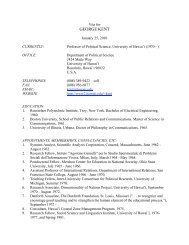
![Fall 2012 POLS 620 Syllabus [PDF] - Department of Political Science](https://img.yumpu.com/25416938/1/190x245/fall-2012-pols-620-syllabus-pdf-department-of-political-science.jpg?quality=85)
